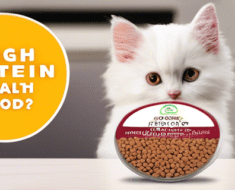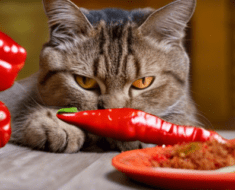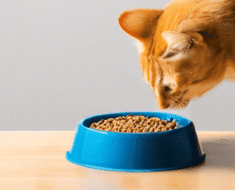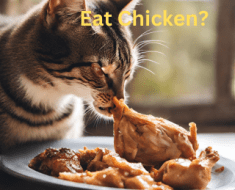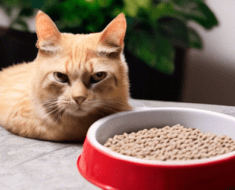Cats can eat raw meat, including beef, chicken, and fish, but it’s important to consult with a veterinarian first. Raw food can provide cats with essential nutrients and some owners believe it closely mimics a cat’s natural diet.
However, it’s crucial to ensure that the raw food is fresh and free from harmful bacteria such as salmonella. Additionally, bones should be avoided as they can pose a choking hazard or cause intestinal blockages. Some cat owners opt for commercial raw food diets that are carefully balanced to meet all of the cat’s nutritional needs, while others prefer to create their own raw food meals at home.
It’s important to research thoroughly and follow veterinary guidance to provide a safe and healthy raw food diet for cats.
Benefits Of Raw Food Diet For Cats
Discover the benefits of a raw food diet for cats and explore what types of raw food are suitable for feline consumption. Opting for raw meats, bones, and organs can improve your cat’s overall health, digestion, and energy levels. Prioritize high-quality, balanced raw food to support your pet’s well-being naturally.
A raw food diet can provide numerous benefits for your feline friend. This type of diet mimics what cats would eat in the wild, which is a diet high in protein and moisture. By feeding your cat raw food, you can enhance their nutrient absorption, promote healthier skin and coat, and improve their digestive health.
Enhanced Nutrient Absorption
A raw food diet allows for enhanced nutrient absorption in cats. Raw food contains natural enzymes and vital nutrients that are often lost during the cooking process. These enzymes help break down food and improve digestion, ensuring that your cat is able to absorb essential vitamins, minerals, and amino acids. As a result, they are more likely to receive the full nutritional benefits of the food they consume.
Healthier Skin And Coat
One of the visible benefits of a raw food diet is healthier skin and coat in cats. Raw food is packed with essential fatty acids, such as omega-3 and omega-6, which are crucial for maintaining a shiny coat and preventing dry skin. These fatty acids also have anti-inflammatory properties, helping to improve skin conditions like allergies and dermatitis. Additionally, the moisture content in raw food helps to keep the skin hydrated, reducing the risk of dryness and dandruff.
Improved Digestive Health
A raw food diet can contribute to improved digestive health in cats. Cats have a short digestive tract designed to efficiently process raw meat. Feeding them a raw food diet allows their digestive system to work as intended, preventing issues like constipation or diarrhea. Raw food is also less likely to contain fillers, additives, and artificial ingredients that can be difficult for cats to digest. This promotes regular bowel movements and a healthy gut.
Overall, a raw food diet can provide your cat with enhanced nutrient absorption, healthier skin and coat, and improved digestive health. Consider making the switch to raw food to ensure your cat receives the full nutritional benefits they need for a happy and healthy life.
Top Raw Foods For Cats
Discover the top raw foods that are safe and healthy for cats to eat, ensuring they get the nutrients they need for optimal health and well-being. From raw meat to organs and bones, these natural foods provide essential nutrients without the added fillers and artificial ingredients found in commercial cat food.
Raw Meat Varieties
Raw meat is an essential component of a cat’s diet as it closely mimics what they would eat in the wild. Here are some raw meat varieties that can provide the necessary nutrients for your feline friend:
- Chicken: A popular choice, chicken offers lean protein and is easily digestible for cats.
- Turkey: This poultry option is rich in essential amino acids, vitamins, and minerals.
- Beef: A good source of protein, beef is a flavorful option that can be included in a cat’s raw food diet.
- Lamb: Another protein-rich choice, lamb can provide variety and satisfy your cat’s taste buds.
- Quail: This small game bird is a unique option that offers lean meat and can be an exciting addition to your cat’s meal rotation.
Remember to source high-quality, human-grade meats to ensure your cat receives the best nutrition possible. It is advisable to consult with your veterinarian before introducing any new protein source to your cat’s diet to address any specific dietary needs or sensitivities.
Bone Broth
Bone broth is a nutritious addition to a raw food diet for cats as it provides a host of benefits. It is rich in essential minerals like calcium, magnesium, and phosphorus, which are crucial for maintaining healthy bones and teeth. Additionally, bone broth contains gelatin, a protein that supports joint health and can be beneficial for cats with arthritis.
You can make bone broth using the bones from the raw meat you feed your cat. Simmer the bones in water for several hours to extract the minerals and nutrients. Alternatively, you can purchase ready-made bone broth from reputable pet food suppliers.
Organ Meats
Organ meats are a vital component of a cat’s raw food diet as they offer a plethora of essential nutrients. These nutrient-dense organs provide cats with vitamins A, D, E, and K, as well as important minerals like iron and zinc.
When incorporating organ meats into your cat’s diet, consider the following options:
- Liver: This organ is packed with vitamin A, essential for vision and overall immune health.
- Heart: A rich source of taurine, an amino acid necessary for proper heart function in cats.
- Kidney: Offers an abundance of essential minerals and vitamins that contribute to overall wellness.
Introduce small amounts of organ meats gradually to your cat’s meals, as they can have a strong taste. It’s crucial to ensure that the organ meats you feed your cat are fresh and sourced from reputable suppliers.
Supplements To Consider
Enhancing your cat’s raw food diet with appropriate supplements can further boost their health and well-being. Consider incorporating the following key supplements:
Omega-3 Fatty Acids
Omega-3 fatty acids are essential for a cat’s overall health, supporting heart function and aiding in the management of inflammation. Sources of Omega-3s for cats include fish oil and krill oil. These supplements can be beneficial for your cat’s skin and coat health.
Taurine
Taurine is a crucial amino acid that cats require in their diet. It plays a significant role in maintaining healthy vision and supporting cardiac function. Adding a taurine supplement can be essential, especially for cats on a raw food diet.
Probiotics
Probiotics are beneficial bacteria that support digestive health in cats. Adding a probiotic supplement to your cat’s diet can help maintain a healthy gut flora and improve their overall digestion and nutrient absorption.
Avoid These Raw Foods For Cats
When it comes to feeding your feline friend a raw food diet, it’s important to be aware of the raw foods that can be harmful to cats. Some raw foods, while suitable for humans, can have adverse effects on a cat’s health. It’s crucial for pet owners to know which raw foods to avoid, in order to ensure the well-being of their beloved feline companions.
Onions And Garlic
Onions and garlic contain compounds that can cause damage to a cat’s red blood cells and lead to severe health issues such as anemia. Even small amounts of onion or garlic in any form, whether raw or cooked, can be toxic for cats. Immediate veterinary attention is necessary if a cat ingests any amount of onion or garlic.
Raw Fish With Bones
Feeding cats raw fish that contains bones can pose multiple health risks. The bones in raw fish can splinter and cause internal injuries to cats. Additionally, raw fish can contain thiaminase, an enzyme that breaks down thiamine (Vitamin B1), resulting in a deficiency that can lead to neurological problems in cats.
Grapes And Raisins
Grapes and raisins are known to be toxic to cats and can cause kidney failure. Even a small amount of grapes or raisins can be harmful. Immediate medical attention should be sought if a cat ingests these fruits.
Transitioning Your Cat To A Raw Food Diet
Transitioning your cat to a raw food diet? Find out the specific raw foods that can benefit cats.
Gradual Introduction
When transitioning your cat to a raw food diet, it’s important to introduce the new food gradually. Start by incorporating small amounts of raw food into your cat’s regular meals, and gradually increasing the portion over a period of several weeks. This will allow your cat’s digestive system to adjust to the new diet without causing any digestive issues.
Consulting With A Veterinarian
Consulting with a veterinarian before making the switch to a raw food diet is crucial. Your vet can provide guidance on the specific nutritional needs of your cat and recommend the best approach for transitioning. They can also address any concerns or potential health issues that may arise during the transition period.
Monitoring Progress
Monitoring your cat’s progress during the transition is essential. Keep an eye on their appetite, energy levels, and overall behavior. Any unusual changes should be noted and discussed with your veterinarian to ensure a smooth transition to the raw food diet.
Frequently Asked Questions For What Raw Food Can Cats Eat
What Raw Meat Can Cats Eat?
Cats can eat raw meat such as beef, chicken, and turkey. It provides essential nutrients for their diet.
What Raw Foods Can Cats Not Eat?
Cats should not eat raw onions, garlic, grapes, raisins, chocolate, caffeine, alcohol, and bones. These foods can be toxic to cats and should be avoided.
How Safe Is Raw Food For Cats?
Raw food can be safe for cats, but it carries risks such as bacterial contamination. Consult with a vet before feeding. Offer balanced nutrition and handle raw food safely to prevent any harm.
Can I Feed My Cat Raw Food And Dry Food?
Yes, you can feed your cat both raw food and dry food, but it’s important to balance the two properly for complete nutrition.
What Raw Foods Are Safe For Cats To Eat?
Raw foods safe for cats include raw meat, fish, and fruits like melon and banana.
Conclusion
Feeding your cat raw food can offer health benefits and mimic their natural diet. From protein sources to appropriate supplements, a balanced approach is crucial. Always consult with your vet to ensure your cat receives proper nutrition. Keep your feline friend happy and healthy with the right raw food choices.
